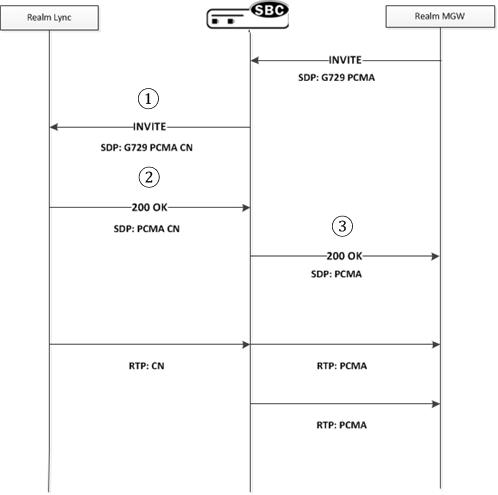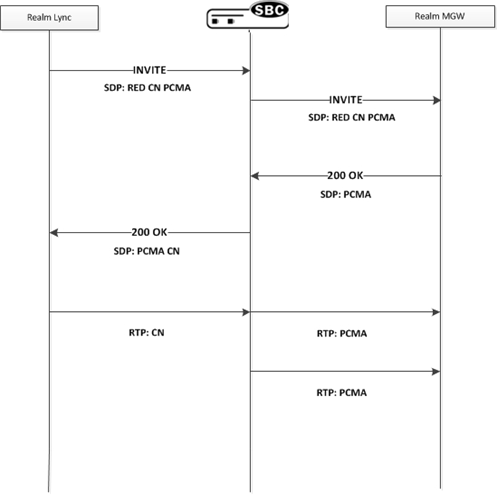Comfort Noise (CN) Generation SPL
Comfort noise (CN) is the noise in a Real Time Transport Protocol (RTP) message (defined in RFC 3389) that is played to prevent a user from hearing completely dead silence on the connection. The Session Description Protocol (SDP) negotiates this RTP message containing the comfort noise using payload type 13 and an rtpname of "CN".
However, when CN is received, normal RTP ceases. Thus, with no RTP traffic, guard timers may trigger and cause the call to be terminated. To correct this, you can load a Comfort Noise Generation SPL that allows the Net-Net ESD to generate "noise" RTP using the normal audio codec when it receives a CN indication.
The CN Generation SPL must be loaded manually according to the procedures described in Loading and Enabling the SPL. After loading the SPL on the Net-Net ESD, comfort noise is added and removed from the SDP to allow for proper negotiation. If properly negotiated in SDP, CN interworking facility (IWF) is enabled in the media flows allowing the Net-Net ESD to generate noise RTP when CN is received.
Note:
CN generation configuration is supported on realms only.The following describes two different cases of how the Net-Net ESD performs the SDP manipulation using the CN Generation SPL.
Case 1

| Process | Description |
|---|---|
| ① | SDP offer received from the realm that has comfort-noise-generate enabled. If the SDP offer contains CN, no IWF is required. If it does not contain CN, and at least one of the offered audio codecs is PCMU or PCMA, CN is added in outgoing SDP offer. |
| ② | If SDP Answer contains the CN codec and topmost audio codec is PCMU or PCMA, Net-Net ESD enables CN IWF. |
| ③ | Net-Net ESD strips CN from outgoing SDP Answer. |
Case 2

| Process | Description |
|---|---|
| ① | SDP offer is sent to a realm that has comfort-noise-generate enabled. If CN was not offered, IWF cannot be performed. If CN is in the offer, the Net-Net ESD forwards the offer to the outbound side. |
| ② | SDP Answer is received from a realm that has comfort-noise-generate enabled. If it contains CN, no IWF is required because both sides support CN. If there is no CN in the Answer, and the topmost audio codec is PCMU or PCMA, the Net-Net ESD enables CN IWF. |
| ③ | If CN IWF is enabled, the Net-Net ESD adds CN to the outgoing SDP Answer. |



